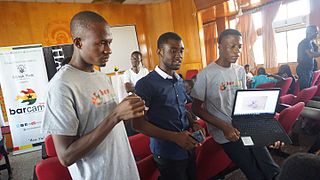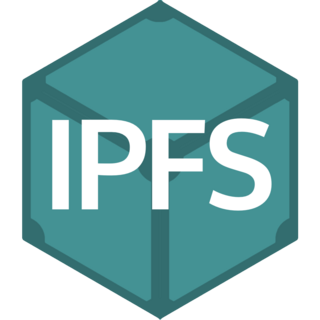Related Research Articles
The Global Multimedia Protocols Group (GMPG) was founded in March 2003 by Tantek Çelik, Eric A. Meyer, and Matt Mullenweg. The group has developed methods to represent human relationships using XHTML called XHTML Friends Network (XFN) and XHTML Meta Data Profiles (XMDP), for use in weblogs.

Tantek Çelik is a Turkish-American computer scientist, currently the Web standards lead at Mozilla Corporation. Çelik was previously the chief technologist at Technorati. He worked on microformats and is one of the principal editors of several Cascading Style Sheets (CSS) specifications. He is author of HTML5 Now: A Step-by-Step Video Tutorial for Getting Started Today (ISBN 978-0-321-71991-1).
Microformats (μF) are a set of defined HTML classes created to serve as consistent and descriptive metadata about an element, designating it as representing a certain type of data. They allow software to process the information reliably by having set classes refer to a specific type of data rather than being arbitrary. Microformats emerged around 2005 and were predominantly designed for use by search engines, web syndication and aggregators such as RSS.

BarCamp is an international network of user-generated conferences primarily focused on technology and the web. They are open, participatory workshop-events, the content of which is provided by participants. The first BarCamps focused on early stage web applications, and were related to open-source technologies, social software, and open data formats.
Microblogging is a form of blogging using short posts without titles known as microposts. Microblogs "allow users to exchange small elements of content such as short sentences, individual images, or video links", which may be the major reason for their popularity. Some popular social networks such as Twitter, Mastodon, Tumblr, Koo, and Instagram can be viewed as collections of microblogs.
A distributed social network or federated social network is an Internet social networking service that is decentralized and distributed across distinct service providers, such as the Fediverse or the IndieWeb. It consists of multiple social websites, where users of each site communicate with users of any of the involved sites. From a societal perspective, one may compare this concept to that of social media being a public utility.
Distributed social network projects generally develop software, protocols, or both.
Webmention is a W3C recommendation that describes a simple protocol to notify any URL when a website links to it, and for web pages to request notifications when somebody links to them. Webmention was originally developed in the IndieWebCamp community and published as a W3C working draft on January 12, 2016. As of January 12, 2017 it is a W3C recommendation. Webmention enables authors to keep track of who is linking to, referring to, or commenting on their articles. By incorporating such comments from other sites, sites themselves provide federated commenting functionality.

Twister is a decentralized, experimental peer-to-peer microblogging program which uses end-to-end encryption to safeguard communications. Based on BitTorrent- and Bitcoin-like protocols, it has been likened to a distributed version of Twitter.

IndieWebCamp is a technology BarCamp that was founded in Portland, Oregon and has since been held all over the world, including at the offices of the New York Times and in Brighton, England. It describes itself as a 2-day creator camp focused on growing the independent web, and spawned the IndieWeb movement.

The InterPlanetary File System (IPFS) is a protocol, hypermedia and file sharing peer-to-peer network for storing and sharing data in a distributed file system. IPFS uses content-addressing to uniquely identify each file in a global namespace connecting IPFS hosts.

Amber Case is an American cyborg anthropologist, user experience designer and public speaker. She studies the interaction between humans and technology.
Micro.blog is a microblogging and social networking service created by Manton Reece. It is the first large multi-user social media service to support the Webmention and Micropub standards published by the World Wide Web Consortium, and is part of the Fediverse, supporting ActivityPub.
Micropub (MP) is a W3C Recommendation that describes a client–server protocol based on HTTP to create, update, and delete posts on servers using web or native app clients. Micropub was originally developed in the IndieWebCamp community, contributed to W3C, and published as a W3C working draft on January 28, 2016.

ActivityPub is an open, decentralized social networking protocol based on Pump.io's ActivityPump protocol. It provides a client/server API for creating, updating, and deleting content, as well as a federated server-to-server API for delivering notifications and content.
IndieAuth is an open standard decentralized authentication protocol that uses OAuth 2.0 and enables services to verify the identity of a user represented by a URL, as well as to obtain an access token, that can be used to access resources under the control of the user.

Irina Bolychevsky is a British activist and data specialist, focused on Open Data, decentralized technologies, and technical standards. She is currently director of standards and interoperability at the NHSX of the United Kingdom Government. She has been part of large organizations in those fields, including the Open Knowledge Foundation, the World Wide Web Consortium, and the Open Data Institute, and worked for the UK, Dubai and UAE government administrations. She co-founded Redecentralize.org, an advocacy group promoting decentralized technologies.
JSON Feed is a Web feed file format for Web syndication in JSON instead of XML as used by RSS and Atom.

Bluesky, also known as Bluesky Social, is a microblogging social platform and a public benefit corporation based in the United States. Jay Graber serves as the company's CEO and Twitter co-founder Jack Dorsey and XMPP creator Jeremie Miller sit on its board of directors.

Nostr is a decentralized network protocol for a distributed social networking system. The name is an acronym for "Notes and Other Stuff Transmitted by Relays". It was designed with goals of censorship-resistance in mind.
References
- ↑ "Founders". IndieWebCamp. Retrieved 2 April 2015.
- ↑ Ben Werdmuller: The IndieWeb as a minimally viable social web ecosystem W3C, 2013
- ↑ Klint Finley: Meet the Hackers Who Want to Jailbreak the Internet Wired, 2013
- ↑ Dan Gillmor: Welcome to the Indie Web Movement Slate, 2014
- ↑ Aldrich, Chris. "Webmentions: Enabling Better Communication on the Internet". A List Apart. Retrieved 2023-01-14.
- ↑ Reece, Manton. "Webmention". Indie Microblogging (book). Manton Reece. Retrieved 2023-01-14.
- 1 2 Reece, Manton. "Microformats". Indie Microblogging (book). Manton Reece. Retrieved 2023-01-14.
- ↑ Reece, Manton. "IndieWeb". Indie Microblogging (book). Manton Reece. Retrieved 2023-01-14.
- ↑ Çelik, Tantek; Case, Amber; Parecki, Aaron; Beasley, Crystal; Marks, Kevin. "IndieWeb: Key Principles". indieweb.org. IndieWeb. Retrieved 2023-01-14.
- ↑ Reece, Manton. "Owning your content". Indie Microblogging (book). Manton Reece. Retrieved 2023-01-14.
- ↑ Reece, Manton. "Building Blocks". Indie Microblogging (book). Manton Reece. Retrieved 2023-01-14.
- ↑ Reece, Manton. "Permanence". Indie Microblogging (book). Manton Reece. Retrieved 2023-01-14.
- ↑ Reece, Manton. "Silos". Indie Microblogging (book). Manton Reece. Retrieved 2023-01-14.
- ↑ Reece, Manton. "Cross-posting". Indie Microblogging (book). Retrieved 2023-01-14.